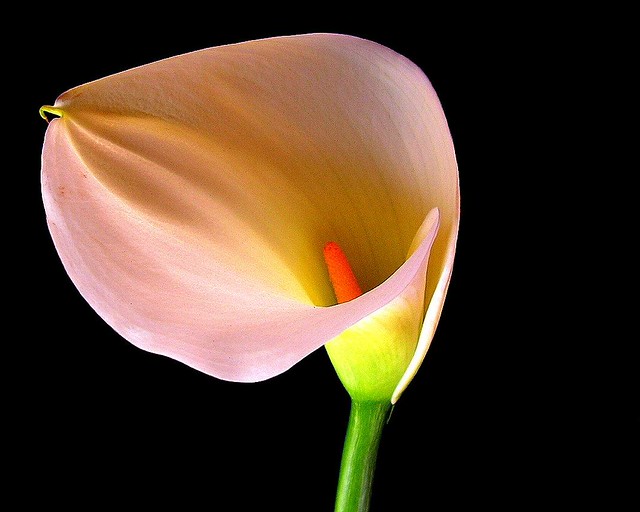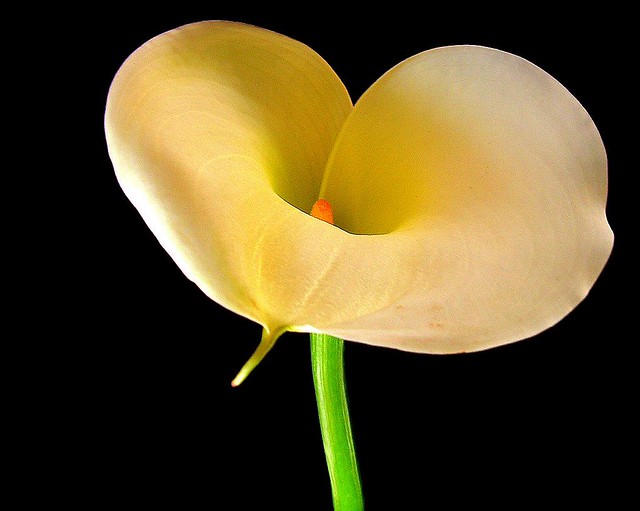.

Aronskelk / Arum lily (Zantedeschia aethiopica): photo by Calllie-Pop, 31 August 2005
What times of sweetnesse this faire day fore-shows,
When as the Lilly marries with the Rose!
What next is lookt for? but we all sho'd see
To spring from these a sweet Posterity.
Robert Herrick: Upon one Lillie, who marryed with a maid call'd Rose, from Hesperides (1648)

Amber Flush Rose, Bagatelle Rose Garden, Paris: photo by Georges Seguin, 1 June 2007

Someone here once knew a maid who marryed a man call'd Rose.
ReplyDeleteOn the evidence of how that union turned out, it seems perhaps tother way round might be the better way to go.
Our Herrick file:
Robert Herrick: Her Legs
Robert Herrick: In the West (His Lachrimae or Mirth, turn'd to mourning)
Robert Herrick: Life is the Bodies Light
Robert Herrick: Memorials of the Obscure
Robert Herrick: Silks
Robert Herrick: The comming of good luck
Robert Herrick: To Groves
Tom ...
ReplyDeleteMy favorite from the Herrick file:
"So Good-luck came, and on my roofe did light,"
May it be true now for us all!
Don
nice.
ReplyDeletewe could
right now do
with a little more Alchemy/Magic
in "it-all" as Flower in her yellow-summer-dress
walks up Houston Street
just as overt Herrick had seen her had kissed "her"
..... so too here....and all of the playing in. Nice post.
A blessing upon the newlyweds, where e'er they may be.
ReplyDeleteRemembering that Herrick, as a country parson, blest many a wedding in his time.
Ed, that yellow dress Houston Street Archetype Girl from Just Around the Corner may have walked straight out of a Herrick poem without even knowing it.
And yes, Don, May good luck light upon us all ASAP.
But ah, Dame Fortune has her own mind, when it comes to luck dispensation...
Born Under a Bad Sign
Que Male Suerte
somehow i want to make this about a monsanto franken-rose-lilly with salmon genes. just where my attention is these days...
ReplyDeleteDavid,
ReplyDeleteMonsanto sent in an aerosol fogger loaded with particulate gluten, but Lily-Rose saw that one coming and said Non, merci!
Lily-Rose a grandi un peu, et pense que peut-être il est temps d'étudier un peu les "Civics".
ReplyDeleteTom,
ReplyDeleteGood for said "maid call'd Rose," who married said LIllie (in her prime it seems), thereupon "What next is lookt for? but we all sho'd see/ To spring from these a sweet Posterity."
On the other hand, on this last day of May, consider RH's warning to Corinna --
Come let us goe, while we are in our prime;
And take the harmless follie of the time.
We shall grow old apace, and die
Before we know our liberty.
Our life is short; and our dayes run
As fast away as do's tghe Sunne:
And as a vapour, or a drop of rainbe
Once lost, can ne'r be found againe:
So when or you or I are made
A fable, song, or fleeting shade;
All love, all liking, all delight
Lies drown'd with us in endless night.
Then while tine serves, and we are but decaying;
Come, my Corinna, come, let's goe a Maying.
5.31
light coming into sky above still black
ridge, white half moon next to branches
in foreground, wave sounding in channel
other views complete, after
it may have been that
far removed, having seen it,
recollection of place
blinding silver edge of sun above ridge,
fog on horizon to the left of the point
Lily-Rose mange pour la premiere fois! Hahaha, I find that hard to believe. As fate would have it, Lily-Rose is a wedding photographer!
ReplyDeleteWhat's in a name? that which we call a rose
By any other name would smell as sweet
(Juliet to Romeo)
All flowers are flirtatious- particularly if they carry hyphenated names. The more hyphens in the name, the flirtier the flower. The one-hyphen flowers - black-eyed Susan; lady-smock; musk-rose -may give you only a shy glance and then drop their eyes; the two-hyphen flowers - forget-me-not; flower-de-luce - keep glancing. Flowers with three or more hyphens flirt all over the garden and continue even when they are cut and arranged in vases. John-go-to-bed-at-noon does not go there simply to sleep.
ReplyDelete(Willard R. Espy / Willard-R-Espy?)
Marie,
ReplyDeleteThat toddler Lily-Rose has had more screen time than many a cinema star, thanks to her doting parents videotaping (and posting on Youtube) what seems almost to be every moment of her life, from birth onward.
That's a wonderful Willard Espy bit. Is it from his Almanac of Words at Play?
(I once worked, sort of, for his son-in-law, George Plimpton.)
Of course Monsanto hadn't yet slouched toward the Death Star to be born at that time, but the issue of botanical hybrids and the "modification" of nature exercised the wits -- and moral sensibilities -- of poets of the Seventeenth Century.
Herrick, a goldsmith's son and himself apprenticed in that craft of fine work and filigree, felt that human arts could improve upon nature; in another poem, he suggests that a lily encased in crystal becomes more beautiful.
On the other side of the question of Art v. Nature there is, notably, Andrew Marvell's Puritan resistance to the formal gardening practises of the time, in specific, as he represents it in "The Mower Against Gardens", the readiness of overweening, "Luxurious Man" to employ artificial (contra natural) practises involving grafts and hybrids: "He grafts upon the Wild the Tame". In that poem, the idea of "taming", "playing" with, meddling in or overruling Nature, comes under stern rebuke.
We know from that poem that Marvell was aware of, and critical of, the tulip mania of the 1630s, when a single exotic bulb put up for sale in Holland drew a price of 5500 florins (for the same price one could acquire 550 sheep). Indeed Marvell uses the phenomenon of the Tulip Craze to insert a witty play upon his own name.
With strange perfumes he did the Roses taint,
And Flow'rs themselves were taught to paint.
The Tulip, white, did for complexion seek;
And learn'd to interline its cheek:
Its Onion root they then so high did hold,
That one was for a Meadow sold.
Another World was searched, through Oceans new,
To find the *Marvel of Peru*.
And see, too, Marvell's gentle ironic teasing of his "little T. C." for attempting to interfere with Nature by "reforming the errours of the Spring"
Mean time, whilst every verdant thing
It self does at thy Beauty charm,
Reform the errours of the Spring;
Make that the Tulips may have share
Of sweetness, seeing they are fair;
And Roses of their thorns disarm:
But most procure
That Violets may a longer Age endure.
Andrew Marvell: The Picture of little T. C. in a Prospect of Flowers
Tom, the book where I found the quote doesn't give more details about the "whereabouts" of it. For a book about quotes, that's quite bad isn't it.
ReplyDeleteThe marvel of little T.C. :-)